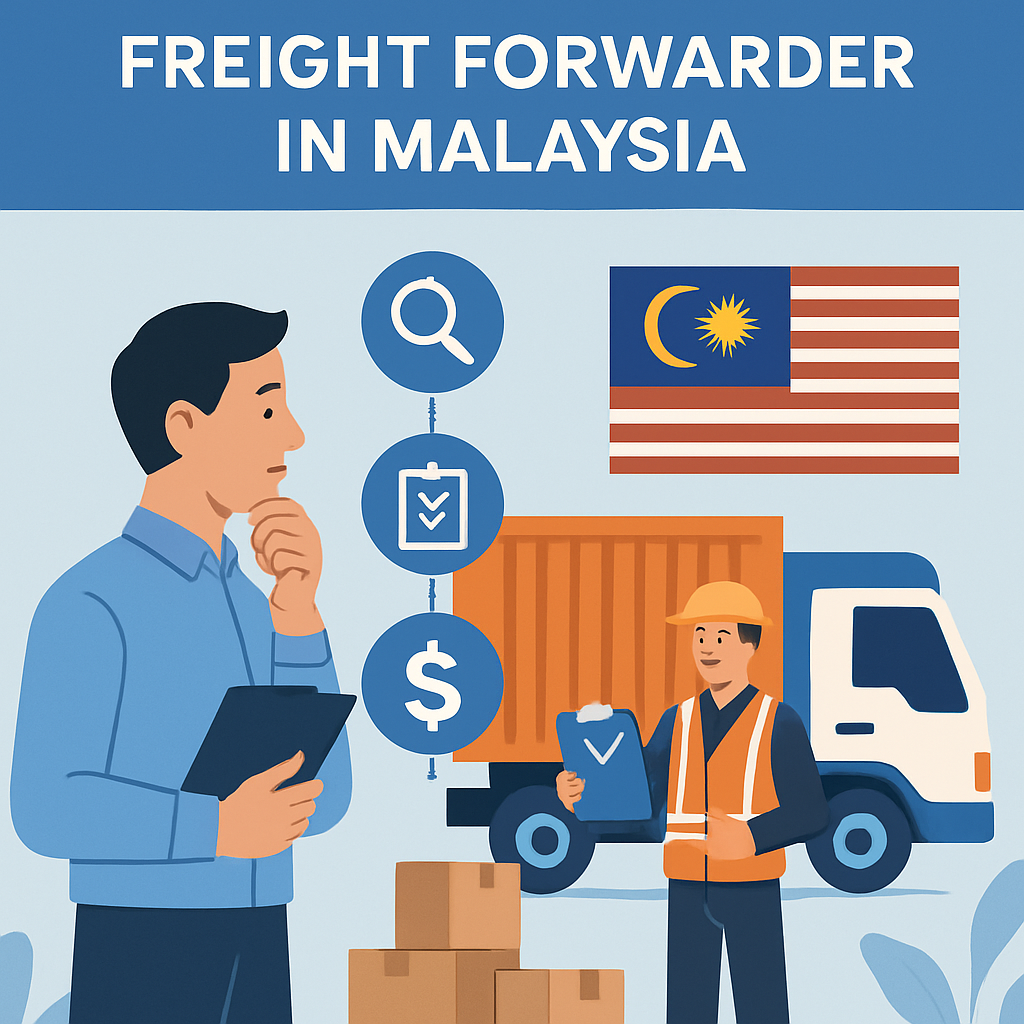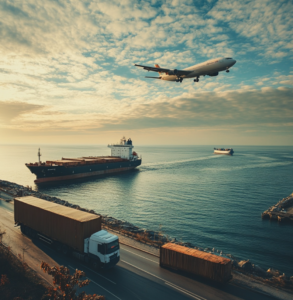How to Choose the Right Freight Forwarder in Malaysia: The Ultimate How-To Guide for Small Business Owners
As Malaysia’s international trade continues to flourish, small businesses are increasingly tapping into global markets—importing raw materials or exporting finished goods to new and rewarding destinations. Yet, the journey from your warehouse to an overseas customer’s doorstep is packed with logistical hurdles. The crucial—but often overlooked—link in this chain is your choice of freight forwarder Malaysia partner.
A reliable freight forwarder does more than move goods—they streamline your entire supply chain, reduce costs, handle regulatory demands, and help you avoid costly missteps. This comprehensive, step-by-step guide is designed to help small business owners navigate the landscape of freight forwarding companies Malaysia offers, ensuring you make informed, profitable decisions.
Table of Contents
- What is a Freight Forwarder and Why Does Your Small Business Need One?
- Essential Benefits of Partnering with a Freight Forwarder in Malaysia
- Types of Freight Forwarding Services: Finding the Right Fit
- Key Factors to Consider When Choosing a Freight Partner
- How to Evaluate Freight Forwarding Companies in Malaysia
- Real-World Examples: Lessons from the Field
- Step-by-Step Guide: Choosing the Best Freight Forwarder Malaysia Offers
- Common Mistakes Small Businesses Make and How to Avoid Them
- FAQs About Freight Forwarders in Malaysia
- Final Tips, Tools, and Resources
1. What is a Freight Forwarder and Why Does Your Small Business Need One?
A freight forwarder acts as your strategic logistics partner—organizing, coordinating, and tracking the transport of your goods from your supplier’s warehouse to your customer, often across borders and modes of transportation. Unlike mere shipping agencies, freight forwarders handle an array of complex functions to keep your goods moving smoothly.
Key Functions of a Freight Forwarder
- Arranging Transportation: Handling shipments across air, sea, road, and rail, often combining methods for optimal cost and transit time.
- Navigating Customs: Preparing and submitting essential documentation, ensuring compliance with Malaysian and international import/export laws.
- Negotiating Rates: Leveraging industry relationships to secure favorable rates from shipping lines, airlines, and trucking firms.
- Cargo Insurance & Risk Mitigation: Assessing risks and offering or arranging appropriate coverage to protect your shipments.
- Supply Chain Visibility: Providing shipment tracking and proactive updates.
- Handling Specialized Cargo: Managing perishable, oversized, hazardous, or high-value shipments with care.
Example:
Imagine you’re an SME importing designer kitchenware from Italy. Your forwarder not only arranges the sea freight from Genoa to Port Klang but also coordinates customs clearance, arranges trucking to your warehouse, and ensures all necessary health and safety certifications are in place—minimizing your administrative burden and risk.
Why Does Your Business Need a Freight Forwarder?
- Expertise: Regulations and requirements change between countries, and even within Malaysia’s ports (Klang, Penang, Johor) procedures may differ.
- Cost-efficiency: Forwarders can access bulk shipping rates unavailable to SMEs dealing directly with carriers.
- Efficiency: They minimize delays, manage paperwork, and troubleshoot problems, allowing you to focus on sales and growth.
- Risk Reduction: They assist in navigating disruptions—natural disasters, strikes, or global events like the COVID-19 pandemic.
Industry Insight:
Trade statistics show that SMEs using experienced freight forwarding companies have a 22% higher on-time delivery rate and 30% fewer customs-related shipment holds than those attempting to navigate logistics independently (Malaysia External Trade Development Corporation, 2023).
2. Essential Benefits of Partnering with a Freight Forwarder in Malaysia
Choosing the best freight forwarder Malaysia can unlock a range of advantages, from improved reliability to significant cost savings.
2.1. Deep Expertise in Customs and Regulatory Compliance
Navigating Malaysian customs can be daunting, especially for first-time exporters or importers. With tighter security and stricter compliance checks (especially for food, chemicals, and electronics), a single error could delay your goods for weeks.
Real-World Benefit:
A Sarawak-based gourmet foods exporter tried handling customs paperwork in-house and suffered a two-week delay due to incomplete Halal documentation. After engaging an experienced freight partner, their compliance error rate dropped to near-zero.
2.2. Access to Global and Local Networks
- Airlines, shipping lines, and trucking partnerships: For tailored shipping solutions and better rates.
- Overseas agents: To coordinate customs clearance and local delivery in foreign countries.
2.3. Cost Optimization and Improved Cash Flow
Through bulk-negotiated rates and smart route optimization, a top freight forwarder Malaysia operator can save your business between 10% and 25% on shipping expenses. They also advise on minimizing duties and taxes via HS Code optimization and free-trade agreements.
Case Study:
A Johor-based electronics distributor saved RM50,000 annually after their freight forwarder recommended transshipping via Singapore for lower port handling fees and improved vessel schedules.
2.4. End-to-End Risk Management
Freight forwarders manage risks ranging from delivery delays and documentation errors to natural disasters and cargo theft. By offering insurance and proactive crisis solutions (such as rerouting during port strikes or lockdowns), they safeguard your business from unexpected losses.
2.5. Streamlined Operations and Focus
By outsourcing logistics to a competent forwarder, you free up time and resources to grow your business, develop products, and serve customers instead of drowning in shipping paperwork.
3. Types of Freight Forwarding Services: Finding the Right Fit
Freight forwarding isn’t “one size fits all.” Leading freight forwarding companies Malaysia provide a variety of services tailored to your products, shipment size, budget, and urgency.
3.1. Main Modes of Freight Forwarding
- Air Freight: Best for high-value, lightweight, or urgent goods.
- Sea Freight: Most cost-effective for large or bulky shipments.
- Road Freight: Ideal for Malaysia and nearby countries.
- Rail Freight: Suitable for regional connections, especially to Thailand and China.
3.2. Specialized Services
- Customs Brokerage
- Project Cargo
- Cold Chain Logistics
- Warehousing & Distribution
3.3. Integrated Logistics Solutions
End-to-end logistics providers offer single-source accountability and supply chain visibility, simplifying complex operations.
4. Key Factors to Consider When Choosing a Freight Partner
4.1. Industry Reputation and Track Record
- How long have they operated in Malaysia?
- Do they specialize in your shipment type?
- Are they members of MIFFA, FIATA, etc.?
Example:
Kuala Lumpur-based exporter shipping halal frozen desserts chose a MIFFA-registered forwarder with perishables experience, avoiding costly setbacks.
4.2. Service Specialization and Scalability
Match forwarder expertise with your industry (hazmat, machinery, eCommerce). Prioritize scalability during peak seasons.
4.3. Communication and Customer Service
- 24/7 support or dedicated account manager
- Multilingual staff
- Proactive exception handling
4.4. Global Network and Local Expertise
Ensure strong connections and deep knowledge of Malaysian port and customs procedures.
4.5. Pricing Transparency and Fair Terms
- All-inclusive, itemized quotes
- Understand port, fuel, and service surcharges
- Penalties or remedies for non-performance
4.6. Certifications, Licensing, and Insurance
- Customs licensing
- Valid cargo insurance
- ISO or quality assurance programs
5. How to Evaluate Freight Forwarding Companies in Malaysia
Evaluating Freight Forwarding Partners — Checklist
- Company Profile and Experience
- Client References
- Regulatory and Industry Certifications
- Digital Tools and Tracking
- Network Breadth
- Capability and Scalability
- Terms, SLA, and Insurance
Success Story:
A Penang-based electronics SME used a freight partner with digital tools to cut 80% of “where’s my shipment” queries and improve delivery performance.
6. Real-World Examples: Lessons from the Field
Example 1: Avoiding a Customs Catastrophe
Johor furniture maker failed to supply correct fumigation papers, causing expensive delays in Australia.
Example 2: Leveraging a Freight Network for Global Growth
Klang apparel company received guidance on US labeling requirements—allowing timely eCommerce platform entry.
Example 3: Managing a Last-Minute Route Disruption
Sabah-based supplier sidestepped the Suez blockage with multimodal rerouting recommended by their freight partner.
7. Step-by-Step Guide: Choosing the Best Freight Forwarder Malaysia Offers
- Define Your Logistics Profile and Needs
- Research and Shortlist Potential Freight Forwarders
- Compare Proposals and Get Detailed Quotes
- Assess Certifications, Compliance, and References
- Evaluate Responsiveness and Technology
- Confirm Terms, SLAs, and Insurance
- Run a Trial Shipment
- Formalize the Partnership
Example:
A Perak tea exporter tested forwarders to Japan with sample shipments. The best performer won a long-term contract.
8. Common Mistakes Small Businesses Make and How to Avoid Them
- Prioritizing price over value
- Skipping due diligence
- Ignoring technology capabilities
- Underinsuring valuable cargo
- Relying on a single provider without a backup
- Not negotiating airtight SLAs
- Poor communication lines with providers
9. FAQs About Freight Forwarders in Malaysia
What documents do I need to provide to a freight forwarder?
Commercial invoice, packing list, bill of lading/air waybill, import/export permits, certificates.
How long does customs clearance take in Malaysia?
Usually 1–3 working days with complete documents.
Do all freight forwarders provide cargo insurance?
No. Always confirm coverage details.
Can a freight forwarder handle “last-mile” delivery within Malaysia?
Yes, many offer warehousing and last-mile via 3PLs or internal fleets.
What if my regular shipment volumes increase rapidly?
Select scalable partners capable of covering unexpected demand spikes.
10. Final Tips, Tools, and Resources
Final Tips to Ensure Success
- Conduct annual performance reviews
- Join professional associations like MIFFA or FMM
- Use freight marketplaces like Freightos or Flexport
- Build strong long-term freight relationships
Useful Resources
- MIFFA – Malaysia International Freight Forwarders Association
- Malaysia Customs
- FIATA
- Federation of Malaysian Manufacturers (FMM)
- Freightos
Conclusion
Choosing the right freight forwarder Malaysia small businesses trust is crucial to seamless global trade. By carefully evaluating your options based on reputation, compliance, specialization, scalability, and service quality—you’ll ensure your products reach the world on time, every time.
Small business growth depends on leveraging the expertise and reach of reliable freight forwarding companies. By following the steps outlined in this how-to guide, learning from real-world examples, and avoiding common pitfalls, you position your business to thrive in today’s global market. Remember: the best logistics partnership doesn’t just cut shipping costs—it protects your brand, supports your growth strategy, and builds customer trust at every stage of your supply chain.
This guide is intended for informational purposes. For tailored logistics or regulatory advice, consult a recognized Malaysian freight forwarding expert.




